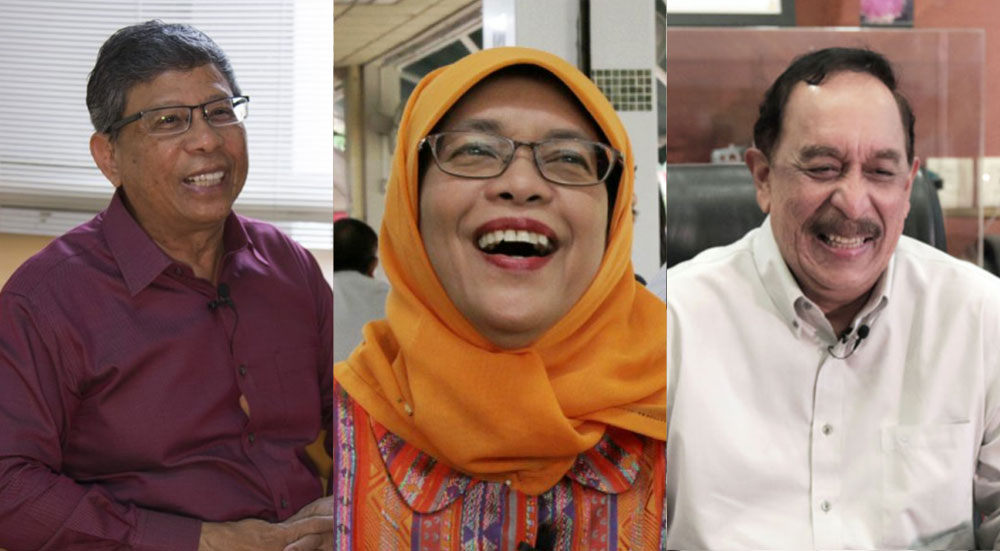In a few hours' time, Singapore is likely to have its first female, Malay, Muslim President.
Afterall, Halimah Yacob was named as the sole presidential election aspirant eligible to run for office two days ago.
Why aren't Singaporeans feeling more excited? Isn't this our "Barack Obama" moment?
Our two young writers, Sulaiman Daud (SD) and Fasiha Nazren (FN), who will qualify as Malays if they were to stand for election in 20-25 years' time, read the online reactions, and decide against their better judgement to tackle tough issues related to the reserved election, meritocracy, the hashtag #notmypresident, and the potential impact of Halimah as the President.
Reserved election and 100 per cent Malay
FN: Halimah was certified as the only eligible candidate for the reserved presidential election. As expected, people are reacting negatively towards the lack of choice and a walkover.
I didn't like the idea of a reserved election and I'm sure I speak for a majority of young Singaporean Malays. To me, a reserved election means that we're putting more thought into a potential candidate's race instead of his/her's abilities.
All three potential Malay candidates are not "100 per cent" Malay, so where's my 100 per cent Malay candidate?!
The point is, what should you really be looking out for when choosing your president? His/her leadership qualities or what race they truly are?
SD: I was sceptical about the Reserved Election. I do see the need for having more multi-racial representation in Singapore's leadership, but I think the way the government went about it could have been done better.
But you know, having seen the reactions following the news of Halimah's walkover, I think it's more important than ever to have a Malay President.
On #NOTMYPRESIDENT
SD: I get that people are unhappy with PE2017, and some have good reasons for their ire. The constitutional changes prevent a promising candidate, Tan Cheng Bock, from competing. It's unfair that only Malay candidates can qualify this time. These are legitimate considerations that should be heard.
FN: The infamous #NotMyPresident hashtag that plagued US president Donald Trump has swept onto our shores.
Yes, I get it. She's a "president-select", not a president-elect. Singaporeans are angry because they didn’t get to choose their head-of-state. But why is this walkover likened to Trump's win?
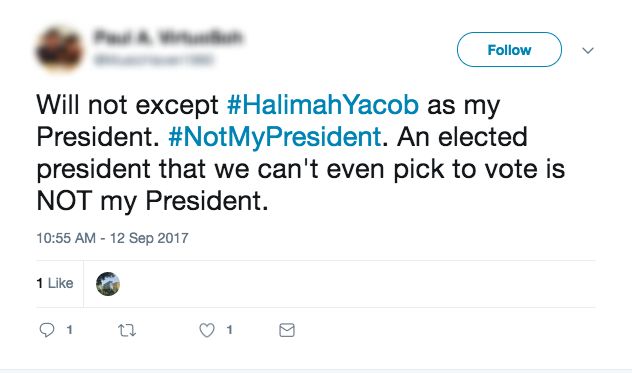 Screenshot from Twitter.
Screenshot from Twitter.
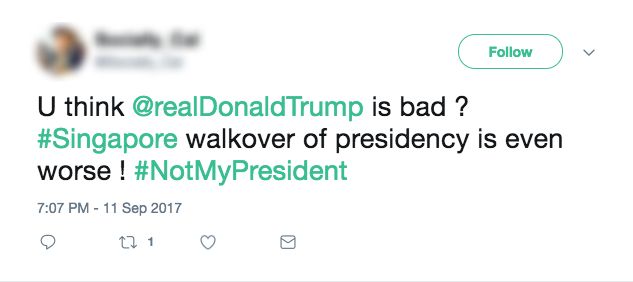 via Twitter
via Twitter
Granted, the topic of who's worse - Halimah or Trump - may be subjective. But come on, you have got to be pulling my leg to say that the US president and Singapore's president-elect are on the same level.
Unlike Trump, she has dedicated her life to public service - it isn't just a business to her. She has been a Member of Parliament since 2001 and held an impartial role of Speaker of Parliament since 2013.
And I definitely don't resonate nor find this personal attack funny:
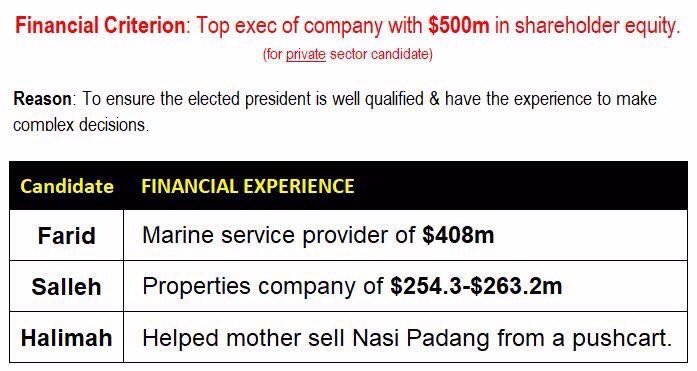
A lot of us are forgetting Halimah's image prior to the elections. She has always had a squeaky clean, scandal-free image and just because of her walkover, her background has been exploited and belittled.
SD: However, I think the hashtag is a godsend to a certain, gutter-dwelling segment of our society. This is the best time for the "I'm not racist, but..." crowd to come crawling out. How delighted they must be to join in with the chorus of voices who are unhappy for other, non-racist reasons.
Everyone who's tossed a resume with a Malay name in the trash. Everyone who still believes Malays don't have to pay school fees, right up till graduation from university (if they even make it there, ha ha). Everyone who believes that the mainly-Malay police officers and firemen of the Home Team are low-class.
This is their time to shine. They're declaring Not My President too. At a distance, it's hard to tell the former from the latter.
Meritocracy
SD: The Institute of Policy Studies conducted a nationwide survey last year to find out if Singaporeans do indeed vote along racial lines, among other questions on race relations. You can see the results below:
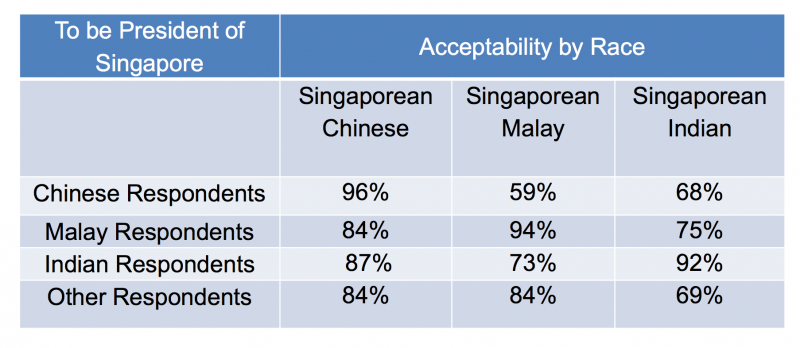 Screenshot from IPS.
Screenshot from IPS.
If an open election is held, assuming the candidates are more or less equal, the Malay candidate is immediately handicapped. A fair contest is impossible, not as long as those views result in those numbers.
One day we will live in a post-racial world, where candidates will be judged solely on their qualifications. On that day, the percentages in each of those columns will be exactly the same. But that day isn't here yet.
FN: I think with the reserved elections, all the more meritocracy plays an important role.
Now, the candidates are given an advantage because only Malays, or those associated with the Malay community can run for president. This can also be a disadvantage because people might think it's unfair that you're giving these people a handicap.
That's why there should be a contest to persuade Singaporeans about their strengths and abilities to lead this country, to prove to non-Malay citizens that hey, we're Malays but rest assured - I have what it takes to run this country and it's not because of my race.
Walkover
FN: Before I come off as pro-Halimah, I feel that a walkover isn't the way to start off her presidency.
As they come from the private sector, Salleh Marican and Farid Khan can only be eligible to run for president if they have a company with a minimum shareholder equity of $500 million - an increase from the previous $100 million.
Meanwhile, all Halimah had to do to qualify was to hold office as a Speaker of Parliament for at least three years.
I wished the PEC could close one eye and grant certification to Salleh and Farid because they appeared to have the ability to contribute as much as Halimah to the Malay community.
Furthermore, since they have no clear affiliations with any political party, they are free from any speculations that there is a hidden political agenda. Thus, the elections would have been interesting given the many dimensions they offer us.
It goes without saying that I am bummed that there wasn't a contest to witness.
SD: Yeah, me too. I sympathise with Farid Khan and Salleh Marican. They are both successful men, by anyone's standards. They have both contributed charitably to the Malay community and Singapore society in general. And I do believe they are sincere in wanting to help the less fortunate in society and speak up for them.
Perhaps Singaporeans could have accepted either the Reserved Presidency, or a walkover, but not both at the same time.
Also, I feel that the qualifications for a private sector candidate are myopic. Yes, managing a huge company is an achievement, but it's not the only achievement in life.
What about people from the sciences, sports, education, or the arts? Can't they be Presidents too? After all, a President is not alone, he has a council of advisors to help out if he needs to make a decision on the national reserves. Multi-racial representation is important, but multi-industry representation should be too.
The significance of Halimah as president - Does it matter?
FN: Let's be honest here: if you think the move from Mdm Speaker to Mdm President is empowering and a nod to feminism, it may not necessarily be.
A president's duty is ceremonial as they serve an ambassadorial role. Meanwhile, a speaker has the power to run a debate and even vote for or against a motion in Parliament.
But technicalities aside, Halimah's role as the first Muslim female president of Singapore matters. Can any other secular countries with no Muslim-majority say that they have a Muslim woman leading their country?
Looking at the bigger picture, Halimah is not just going to be a role-model for young Singaporean Malay-Muslim girls, she will be looked up upon by any Muslim girl in the world that we are capable of holding a position popularly helmed by men.
SD: In normal circumstances, you could argue that the move from the Speaker's chair to the Presidency would be a step down for the reasons you mentioned.
But nothing happens in a vacuum. We must look beyond our own shores, and see the broader picture.
We live in a time where Islamophobia is rife and extremism is gaining strength. ISIS commit atrocities in the Middle East while in Europe and America, neo-Nazi and extremist groups gain popularity. Major party politicians openly talk about Islam and Muslims as a problem.
I believe that having a Malay-Muslim President as the Head of State will send a powerful, worthy message that Muslims can live peaceful lives in harmony with others within a secular democracy. I think that representation is important, and Halimah will be a role model that we can be proud of.
In a year, hopefully, most of the vitriol would have died down.
But young girls and boys will be entering primary schools for the first time, and they will look up at the wall and see Halimah's Presidential portrait.
Hopefully, some will be inspired to follow in her footsteps, step up and serve, and we will not have a walkover reserved election again.
Top photo collage created from Mothership file photos
Here are some totally unrelated but equally interesting stories:
There are tons of GrabRewards points you haven’t been using
This app lets you read nostalgic books from your youth for fre
If you like what you read, follow us on Facebook, Instagram, Twitter and Telegram to get the latest updates.
